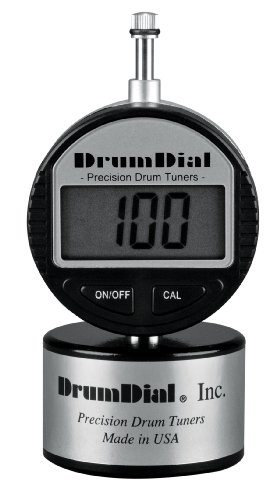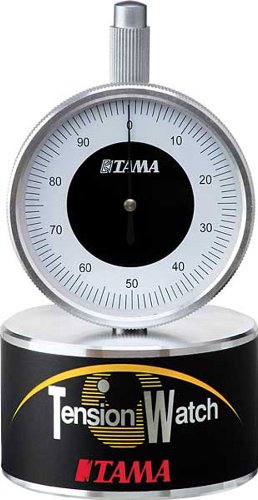As an important (and often overlooked) tool for drummers, the drum tuner is a must-have item. We're going to take a look at the 5 best drum tuners in 2024 to help shed a little light on what's available.
Even though these are newer digital upgrades to their analog ancestors, the tuner's designs have changed very little over the years.
Table of Contents
The functionality of a drum tuner is simple, so don't expect any real bells and whistles in today's reviews. But make no mistake - each is well worth their salt, as any seasoned drummer will already know.
Related: In-Ear Monitors for Drummers.
At a glance: Our top 3 picks
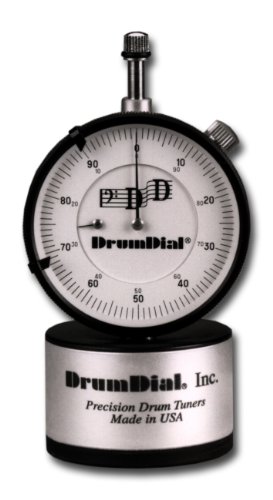
DrumDial Precision Drum Tuner

- Analogue.
- Very precise drums tuner.
- Easy to use once you know how.
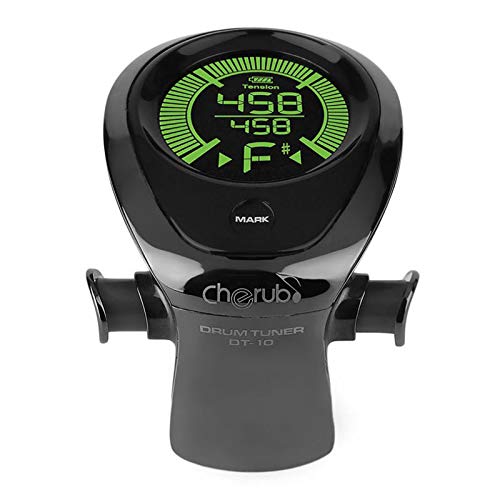
Cherub DT-10 New Black Shelf Drum Tuner

- Analogue.
- Very precise drums tuner.
- Easy to use once you know how.
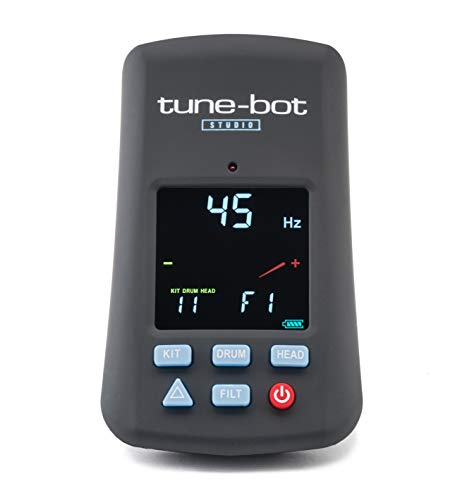
Tune-Bot Studio TBS-001 Digital Drum Tuner

- Analogue.
- Very precise drums tuner.
- Easy to use once you know how.
View The Best Drum Tuner Below
1. DrumDial Precision Drum Tuner
The DrumDial OG models are some of the best on the market. They're popular in fact, that they have stolen three out of five positions in our selections today.
The precision model measures pressure instead of pitch, and it's very accurate. It's very well designed and pretty much a go-to gauge, though the analog nature can be tough to master for some if they don't know what they're doing.
It has an understated simplicity, which essentially couples a dial indicator to a custom-designed base, resulting in a very basic but thorough product that enables the user to set lug each to precisely matching tensions.
It comes ready-calibrated at absolute zero and has an instruction manual to fill-in the newbies on its easy functionality. Once you have the technique down, this drum tuner shortens tuning time by up to 60%.
Pros:
+ Analogue.
+ Very precise drums tuner.
+ Easy to use once you know how.
Why We Liked It - It's one of the most trusted analog tuners on the market, which measures the pressure of the actual drum head rather than the tension rods, making it far better.
2. Cherub DT-10 New Black Shelf Drum Tuner
If you need to tune your drums, our second selection is a digital drum tuner that features a universal clip, making it compatible with all acoustic drums. The clamp is flexible and won't cause any damage.
This digital drum tuner gives the note in keys and has a meter to help visually denote whether you need to tighten or loosen.
It's easy to use on your drums. You simply use the MARK function to set a key. Then use the visuals, which work on Cherub's proprietary algorithm to balance the drum head.
It's a rechargeable USB option, which means you don't have to worry about carrying spare batteries. It has a battery life of around 5 hours. This means you can tune your drums wherever you are.
Pros:
+ Well-made.
+ Pitch tuning.
+ Rechargeable USB.
Why We Liked It - This is an accessibly priced bus powered option that makes for a convenient digital tuner. The clamp is flexible, meaning you can tune your drums, whatever the size.
3. Tune-Bot Studio TBS-001 Digital Drum Tuner
Next, we have a digital model up for comparison. Digital models make tuning your drums effortless. Electronic models work by monitoring the pitch rather than the tension, like an analog tuner. They work much like a digital guitar tuner which some of you may be more familiar with.
It's easy to set up, which makes it the best drum tuner for beginners. It just clips to the rim of your drum hoop, meaning you can tune your drums easily. This drum tuner capably filters out the overtones to decide the pitch your strike produces at each lug position. It gives a visual reading via its 4-color LCD display, both in hertz and musical notes.
These drum tuners are capable of recognizing a range of frequencies, making them a useful tool for tuning low bass drums high toms and everything in between.
They let you save five pitch settings for easy recall at a later date, allowing you to experiment with different tones and still find the sound you previously had.
Pros:
+ Color LCD display.
+ Reading in Hz and notes.
+ Save and recall settings.
Why We Liked It - It's a handy piece of tech which is easy to use and competitively priced.
4. DrumDial Digital Drum Tuner
The DrumDial digital model is next on our 5 Best Drum Tuners list. This drum tuner is the electronic version of the analog precision tuner. It works by assessing the tension rather than pitch.
It accurately measures at each rod point, gauging and reading the head itself for better rebound performance.
It has a colored LDC screen. It's back-lit to help on stage and in dimmer environments. However, it's a little draining on the batteries, so you will want to ensure you lug around some spares.
It comes with a protective case to ensure it stays as accurate as it was created to be. This means tuning your drums will always be easy.
Pros:
+ Digital tuner.
+ Tension measure.
+ Back-lit screen.
Why We Liked It -It gives an easy to read measure of the tension across your head.
5. TAMA TAMTW100 Tension Watch
The Tama TamTW Tension Watch is an analog tuner, which works in a very similar manner to the DrumDial we opened our article with.
It accurately measures the tension, allowing users to set each rod position to the same pressure, ensuring the head is equally pulled from every direction in 360-degrees.
Each line of the dial is 1 millimeter apart, and each represents 1/10th of an inch, so it is very precise.
This Tension Watch tuner is well-manufactured and functions very simply. Again, once you know what you're doing, tuning drums becomes easy. This helps cut-down tuning time very effectively, making it one of the best drum tuners for beginners.
Pros:
+ Analog tuner.
+ Accurate measurements.
+ Well-manufactured.
Why We Liked It - This is another great example of an analog drum tuning model.
Drum Tuner Buyers Guide
What is a Drum Tuner?
Tuning drums can be hard. A drum tuner is a tool to help you adjust the frequency or pitch of a drum. They can be analog or digital in nature. They make the process of drum tuning easier and quicker as well as more accurate than with a torque key by ear.
An analog tuner measures the tension of either the drum head or the tension rod itself. A digital tuner focuses more on the pitch, measuring the frequencies the drum produces when struck.
Do I Need a Drum Tuner?
Tuning your drums is essential. There are a number of tuned percussive drums, such as timpani, which are utilized in orchestral performances. They need to be kept at a definite pitch, so they don't clash with the rest of the music.
While a drum-kit is, technically speaking, a non-pitched percussive instrument, it does still require tuning. Most ready-made drum-kits will come with a standard torque key for that exact reason.
A drum is made from component parts with the skin or drum heads seated over the top. The vibrations caused by striking the drum heads can produce overtones that are disharmonious, spoiling the tone.
The majority of drummers will tune by ear until they reach their preferred tonality. As the skins or drum heads stretch (and dent), the sound changes over time. Drum tuning needs doing once in a while to get the best out of your drums.
Temperature can also affect the tone of the drum because the metal-rimmed hoops (which help hold the tops in place) expand when they're hot and shrink when they cool, which, in turn, stretches and loosens the skins.
This affects the rebound and, therefore, the response. The poor rebound can actually make your tempo less accurate.
So drum tuning is important and is a constant process. With any type of drums, tuning by ear can be a tough and lengthy process, even for a professional. The assistance of drum tuners is a wise idea.
How To Tune A Drum?
You simply tighten or loosen the lug of the tension rod with a torque key. You should always tune the tension rod opposite to the one you have just tuned. While you tighten one, you will find those around it actually loosen. Tuning on opposite sides can help counter this, speeding things up, with or without drum tuners.
What to Look for When Buying a Drum Tuner?
You need to decide whether you want an analog or digital option. There aren't too many competitive drum tuners on the market. While most drum makers will have their own version of drum tuners, some of these can be quite pricey and aren't drum-kit specific. So don't feel you need to spend $500 on a Pearl tuner for a Pearl kit.
Analog tuners are generally the cheaper way to go, but some can find them a little frustrating at first, as digital tuners are easier to read. If you're a beginner, tuning your drum with a tuner that's easier to read is a good option.
The analog versus digital tuning argument is a tough one to settle. It really boils down to personal preference. But consider whether you're looking to have a particular pitch on your drum or just keep the tension equal for 360 degrees to ensure you get a good rebound.
Conclusion
A drum-tuner is a pretty essential item that can help save hours of painstaking work.
With so many variables that can affect the sound of your drums and its tuning and rebound abilities, their benefits really do speak for themselves.
While there are some on the market that fetch in the excess of four-hundred-bucks, there are also some more conservatively priced options available.
They differ very little, but here are a few top tuning items choose from. Hopefully, our reviews and the info packed into our guide will help you when it comes to tuning your drums.
Expert Tip
With analog tuners and older heads, it's important to remember that the suggested pressure or tension settings might not be suitable. Higher tensions can cause splits, so adjust accordingly.
Did you Know
Sometimes the sound you prefer may require less of a ring. This can be adjusted by muffling methods. There are a number of rings, gels, and pad products on the market to help with this. They can work especially well for older skins when applied.
If you've enjoyed this review by Music Critic, please leave a positive rating:

